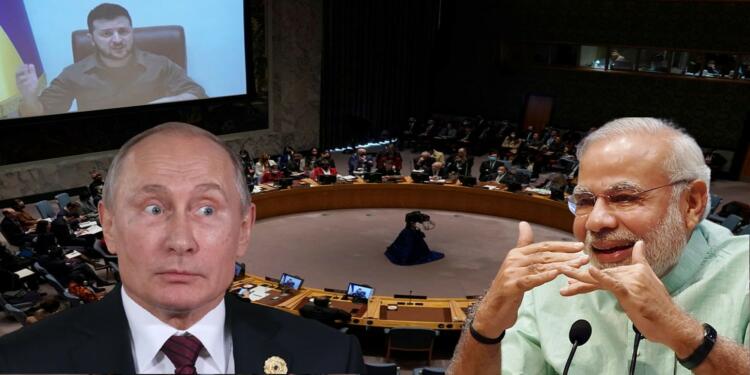When Prashant Bhushan was fined Rs 1 for Contempt of Court, many people from a faction of media establishment made fun of Apex Court. The moral blindness can be gauged from the fact that they failed to understand that the Apex Court had made Bhushan accept his fault. Something similar was recently witnessed when media portals went on blitzkrieg claiming that India had voted against Russia at UNSC.
India did “vote” against Russia
Recently, Zelenskyy took the advertisement of Ukraine’s independence day to international level. On August 24, it was proposed that he will address the United Nations Security Council. You don’t get any points for guessing that Russia indeed objected to it. The Putin-led administration considered this as a suo moto stance by the West-led faction. Vassily A. Nebenzia, Russian Ambassador to the United Nations, wanted a vote on the proposal.
Since Russia is one of the P-5 members of the grouping, countries did oblige and voting began. 5 permanent members and 10 non-permanent ones participated in it. India, currently being a non-permanent one also participated. To the utter surprise of most people, it voted for Zelenskyy’s freedom of speech to be upheld. China abstained from the motion while all other countries voted in favour of Zelenskyy’s speech.
Media rushed in
As soon as Indian media got the news, they started to portray it as the beginning of India’s anti-Russian stance. Almost every news portal, no matter newly established or more than 100 years old, termed the move as India’s stand against Russia. They were able to convey the message that India is drifting towards their favourite pseudo-liberal west.
The hullabaloo conveyed through headlines helped them pull numbers. But, the devil in detail of their news coverage ended up belying the message. Yes, India did vote against Russia, but India’s vote did not have any consequential effect on the Russian bonhomie with India. For this, there is a need to understand the technicality of voting in UNSC.
Understanding UNSC voting
In the UNSC, there are two kinds of voting. The first is non-procedural and the second is procedural. Non-Procedural votes, also known as motion decides the policy of UNSC. If One permanent member goes against the motion, the proposal is taken back.
On the other hand, procedural votes are there to decide how the day-to-day operations will take place. Even if a permanent member votes against the proposal, the motion can be picked up by the body. It was evident in Zelenskyy’s speech when in spite of Russia’s denial, Zelenskyy lectured UNSC resulting in a slugfest between him and Russian officials present in UNSC.
In other words, while non-procedural votes are like elections for being a student leader, procedural votes are like canteen elections in college politics.
Vote was inconsequential
It is amply clear that non-procedural voting holds more importance than the procedural ones. In all these votes, India’s stance is clear. India has always abstained from voting whenever such a proposal was put forth in UNSC. In fact, Russia has been thankful to us for our ‘independent and balanced’ stand. When it came to procedural issues, India’s vote did not matter. This is the reason why it was not against Russia.
Even the Ministry of External Affairs has conveyed it. MEA spokesperson, Arindam Bagchi said, “My understanding is that we have not voted against anybody. It was a proposal to allow him to speak virtually, and we allowed it. It was the third occasion he spoke virtually [at the UN], and we supported that. So, there is no question of us voting against Russia”
But biased coverage did actually do one good thing for India. Now, western policymakers will think that if they provide lucrative offers to India, the Modi government may change its policy.
Support TFI:
Support us to strengthen the ‘Right’ ideology of cultural nationalism by purchasing the best quality garments from TFI-STORE.COM




















